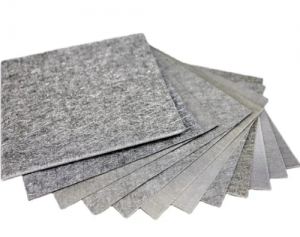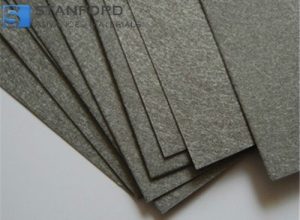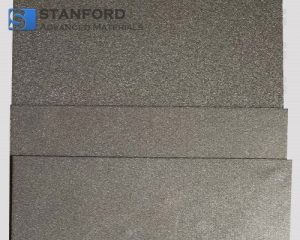Metal Fiber Felt for Filtration: Types and Benefits

Introduction
Metal fiber felt is an innovative material widely used in various filtration applications. It possesses exceptional properties, including high porosity, excellent permeability, and resistance to high temperatures and corrosion.

Metal Fiber Felt
This article explores the different types of metal fiber felt, their unique benefits, and the wide array of applications ranging from aerospace to chemical processing. Hope that you can have a better understanding.
Learning about Metal Fiber Felt
Metal Fiber Felt is an advanced filtration material crafted from sintered metal fibers. It offers a unique combination of durability, precision, and efficiency in filtration applications. Unlike traditional woven or non-woven filtration materials, metal fiber felt comes with three-dimensional porosity and high surface area. These features allow for high filtration efficiency and excellent permeability.
This innovative material is produced by laying down fine metal fibers in a random web-like pattern. Thereafter, the high-temperature sintering process bonds the fibers at their contact points and creates a stable and robust structure capable of withstanding harsh environmental conditions.
Metal Fiber Felt’s versatility is further enhanced by the availability of different metals, such as stainless steel, nickel, titanium, and aluminum. Each of them stands out for specific properties tailored to particular applications. With its superior filtration capabilities, metal fiber felt plays a crucial role in improving product purity, protecting critical equipment, and ensuring the safety and efficiency of industrial processes.
Types of Metal Fiber Felt
You can classify metal fiber felt based on the metal type used in its production. Each type has its unique properties tailored to specific applications.
--Stainless Steel Fiber Felt
Stainless steel fiber felt is the most common type. It is prized for its resistance to oxidation and corrosion. It is ideal for applications involving high temperatures and corrosive fluids.

Stainless Steel Fiber Sintered Felt
--Nickel Fiber Felt
Nickel fiber felt is notable for its excellent thermal and electrical conductivity, so it is suitable for electrochemical and high-temperature filtration applications.
--Titanium Fiber Felt
Titanium fiber felt stands out for its extraordinary resistance to corrosion, especially in seawater and chlorine environments. Therefore, it is perfect for the chemical processing and marine industries.

Titanium Fiber Felt
--Aluminum Fiber Felt
Aluminum fiber felt offers excellent thermal conductivity and is lighter than other metal fiber felts. It has been ideal for aerospace and automotive applications where weight is a critical factor.
Benefits of Metal Fiber Felt
Metal fiber felt offers several advantages over traditional filtration materials, including:
- High Filtration Efficiency
The three-dimensional structure of metal fiber felt provides a high surface area for filtration. Consequently, it can capture particles effectively while maintaining excellent flow rates.
- Durability and Strength
The sintering process used to manufacture metal fiber felt imparts high mechanical strength and durability, so the material to withstand harsh operational conditions without degradation.
- High-Temperature Resistance
Metal fiber felt can operate effectively in environments with temperatures ranging from cryogenic levels to above 1000°C, depending on the metal used.
- Corrosion Resistance
With materials like stainless steel, titanium, and nickel, metal fiber felt offers superior resistance to corrosion. It extends the lifespan of filtration systems in aggressive chemical environments.
- Customizability
Metal fiber felt can be produced with varying thicknesses, porosities, and fiber diameters. SAM allows for customization to meet specific filtration requirements.
Applications: Metal Fiber Felt for Filtration
The unique properties of metal fiber felt make it suitable for a wide range of applications across various industries.
1. Chemical Processing
In chemical processing, metal fiber felt plays a crucial role in filtration systems designed to separate liquids and gases. This application is vital for maintaining the purity of chemical substances and preventing any form of contamination during critical manufacturing processes.
The material has resistance to a wide range of chemicals. It can withstand aggressive substances without degrading, thus guaranteeing consistent performance and reliability.
2. Aerospace
The aerospace sector demands materials that can perform under the most rigorous conditions. Metal fiber felt has become an ideal choice for this industry. It is extensively used in the filtration of hydraulic systems and fuel lines. It is crucial for the safe and efficient operation of aircraft.
The material can withstand extreme temperatures and pressures. Besides, its durability makes it an essential component in ensuring the reliability of aerospace systems.
3. Automotive
In the automotive industry, this felt finds various applications. It serves as a highly efficient filter medium for engine oil, fuel, and air. Its use significantly contributes to the enhanced performance and extended lifespan of vehicle components.
By effectively removing contaminants, it ensures optimal engine efficiency and reduces the wear and tear on automotive parts. It leads to improved vehicle reliability and performance over time.
4. Pharmaceutical
The pharmaceutical industry requires stringent standards for purity and cleanliness, so metal fiber felt has become a valuable asset in the filtration of gases and liquids. Its utilization is critical in creating sterile conditions for the production of pharmaceuticals, where even minor contamination can have significant implications.
The material comes with high filtration efficiency and resistance to contamination. It is an ideal choice for maintaining the strict hygiene standards necessary in pharmaceutical manufacturing.
5. Water Treatment
In water treatment facilities, this felt is employed to remove contaminants from water. It plays a pivotal role in ensuring the availability of clean and safe water.
Its effectiveness in filtering out harmful substances and particles contributes significantly to public health and environmental protection. The material's durability and resistance to biofouling make it suitable for long-term use in water treatment processes, where reliability and efficiency are essential.
Conclusion
Metal Fiber Felt for Filtration stands out with efficiency across diverse industrial applications. Its impact is profound, ranging from enhancing vehicle performance to ensuring the purity of pharmaceuticals and providing clean water.
As technology advances and demands for high-performance filtration materials rise, its role in supporting and advancing these critical industries is set to grow even further.
Stanford Advanced Materials (SAM) serves as a premier supplier and manufacturer of metal fiber felt. Customization is also available. Please check our homepage for more information.
{{item.content}}
LEVE A REPLY
{{item.children[0].content}}
{{item.content}}






